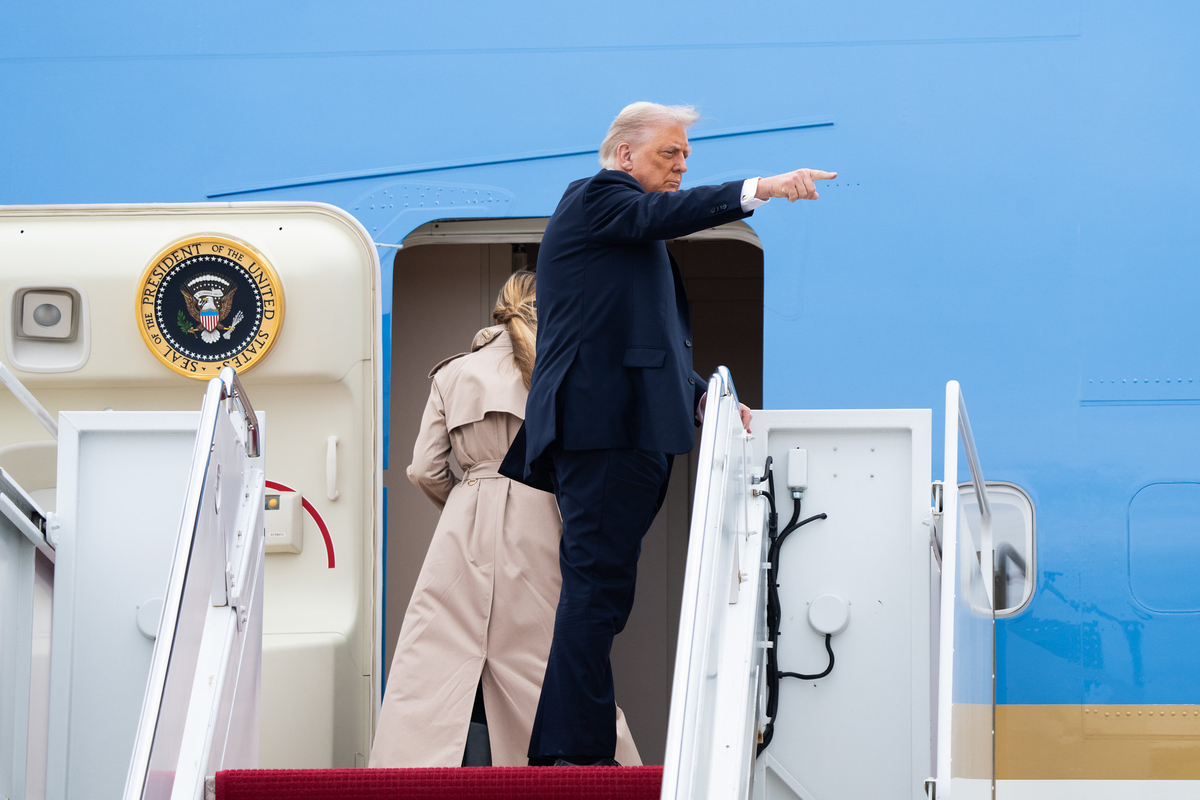Copyright kyivpost

US President Donald Trump departed Friday night for a high-stakes, three-stop tour of Asia, with the diplomatic swing immediately overshadowed by North Korea’s nuclear threat and a rapidly escalating trade war with Beijing. Amid the flurry of trade negotiations, officials and experts in Washington have inserted a critical and sensitive geopolitical objective: forcing China to curb its purchase of Russian oil, a move designed to starve Moscow’s war machine in Ukraine. The White House confirmed that the centerpiece of the trip will be a face-to-face meeting between Trump and Chinese President Xi Jinping during the Asia-Pacific Economic Cooperation (APEC) Summit in South Korea. Given the focus on global security and energy politics, this high-level dialogue confirms a strategic pivot: the original US-China “trade war” has been entirely consumed by the conflict in Europe. Trade war and the rare earth lever The pressure on Beijing comes as the world’s two largest economies are already embroiled in an economic standoff. China recently imposed export controls on rare-earth magnets – minerals critical for everything from electric vehicles to advanced fighter jets – prompting a threat from the Trump administration to impose a new, crippling 100% tariff on all Chinese goods by November 1. This tariff showdown sets the stage for the trip’s agenda. A senior US administration official told reporters on Friday that the agenda for the Trump-Xi meeting would prioritize several areas: the ongoing trade issues, China’s controversial export controls, and, critically, “China’s purchase of Russian oil.” This linkage of the Sino-American trade conflict with the war in Europe marks a significant shift, using the economic leverage built up during the trade disputes to prosecute a geopolitical goal in Ukraine. Sanctions shockwave The decision to focus on China’s energy imports follows a period of mounting frustration in Washington over the lack of progress in ending the Russia’s war in Ukraine. Specifically, this strategy follows recent major punitive action. Earlier this week, the Trump administration imposed what the White House called “tremendous sanctions” on Russia’s two largest oil companies, Rosneft and Lukoil, with the stated aim of degrading the Kremlin’s ability to fund its military. Experts view this as a dramatic escalation, but its success hinges on global compliance, placing China and India—the two largest buyers of discounted Russian crude—directly in the US crosshairs. To enforce this compliance, the US Treasury Department has threatened secondary sanctions, warning that any foreign financial institution facilitating these transactions could be cut off from the American financial system. “Both economic coercion and tangible conflict tool” During a Friday morning press call previewing the visit, analysts at the Washington-based think tank CSIS dissected the strategic rationale behind this aggressive new negotiating stance. Asked if the White House’s focus on Russian oil was primarily an issue of economic coercion or a direct tool against the war in Ukraine, Victor Cha, president of the Geopolitics and Foreign Policy Department at CSIS, responded definitively that he believes it is “both.” A senior US congressional staffer knowledgable about the upcoming trip, told Kyiv Post that the source of Washington’s power, rests in the threat of secondary sanctions – hitting Chinese banks that facilitate these transactions. Enforcement would significantly raise the cost for Beijing. However, compliance with the US demand would mean a self-inflicted economic wound for China. Philip Luck, director of the CSIS Economics Program, injected a crucial context for Beijing, noting that abandoning cheap energy “would significantly impact their domestic economy, which is already dealing with internal real estate issues and the trade war.” In essence, Washington is demanding that Beijing pay a premium for compliance with a foreign policy objective. Normalization of ‘weaponized interdependence’ The core dynamic, according to experts, is the “troubling normalization of ‘weaponized interdependence,’” where global connectivity itself becomes a source of strategic vulnerability. Henrietta Levin, senior fellow at the Freeman Chair in China Studies, noted that both Beijing and Washington are now actively seeking to turn global reliance – on energy, supply chains, and financial systems – into coercive tools. When asked by the Kyiv Post how Trump could compel Beijing to significantly reduce its technological support for Russia’s war machine, Levin noted that the core leverage available to the US is the threat of financial sanctions against Chinese banks, particularly those already targeted by the Europeans. “If President Trump is willing to threaten credible sanctions against Chinese financial institutions... I think that could really constrain the flow of these dual-use goods, of machine tools, of propellants, of UAV parts, other really critical materials to the Russian military,” she stated. The expert cautioned this action would not stop the material support entirely, but it could make it “slower, more expensive, and more frustrating for the Russians,” which could have a “significant difference, potentially, in terms of the balance of forces on the battlefield in Ukraine.” A second, crucial piece of leverage, according to the analyst, is transatlantic unity. Levin suggested that Beijing pays closer attention to concerns about its role in the war “when the US and Europe act together.” She cited the recent coordination on sanctions targeting Russia’s energy sector as an encouraging, yet incomplete, sign. “We’ll also be looking to see whether there can be more focus on developing a coordinated transatlantic approach on the question,” Levin said. Despite the potential of a united front, this coordinated approach may be hampered by prioritization in the Trump administration. When asked by Kyiv Post how likely Trump was to deprioritize pressuring China on Russia in favor of tactical economic “quick wins” on trade or Taiwan, Levin replied that the focus “tends to be on these more tactical economic considerations,” indicating those politically salient issues would likely be prioritized ahead of broader strategic concerns like Ukraine. Levin found it “quite striking” that Trump has only recently been willing to publicly broach the issue of China’s Russian energy purchases, despite expressing concern over similar purchases by India for months. She concluded that Trump has been largely focused on “maintaining a positive atmosphere to achieve progress on some of these economic considerations,” indicating a consistent preference for immediate trade deal outcomes over foreign policy irritants like China’s role in the Ukraine conflict. Allies look to ‘Plan B’ as Trump focuses on deals Beyond the high-wire act with China, the trip will be measured by its impact on key US allies. Victor Cha suggested that the recurring theme in Japan and South Korea will be “Trump the Moneymaker,” with the President expected to boast about massive new investments slated for the US. Yet, despite the public accommodations, Cha cautioned that US allies are wary of the pressure, with many countries “quietly looking at contingency plans or Plan Bs” to manage the possibility of “three more years of US pressure and bullying.” Meanwhile, leaders in Southeast Asia are focused less on grand strategy and more on securing “trade deals that offer short-term stability,” even as the broader region worries about the “fraying of interdependence under the rivalry,” noted Erin Murphy, Senior Fellow at the Emerging Asia Economics Program. Ultimately, the normalization that Levin describes is the acceptance across the Indo-Pacific that economic ties are no longer purely commercial. The confluence of the North Korean threat, the tariff deadline, and the demand regarding Russian oil purchases ensures an unpredictable trip. As Victor Cha concluded, while there may be an official script to the next few days, “I would not be surprised if there are things that happen that go off the script.” The critical question is whether Trump can translate this high-pressure strategy into concrete foreign policy wins, both in Asia and in Ukraine.



